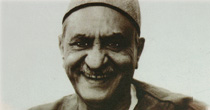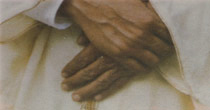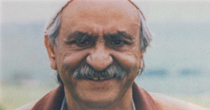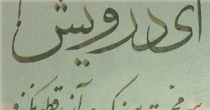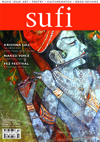Media Library | Writings | Dr. Alireza Nurbakhsh
Divine Love
by Dr. Alireza Nurbakhsh
The first time I read Rumi's story of Moses and the Shepherd, I was struck by the fact that the shepherd was much closer to God than Moses even though the shepherd's conception of God was not even remotely plausible. Years later, when I revisited this story, it appeared to me that Rumi had unravelled a deep mystery of divine love: in order to love God, one does not need to have a correct conception or description of God; what is required is a burning heart.
Rumi's story begins when Moses, on his way through the desert, came upon a shepherd addressing God. " O You who decide all things;' the shepherd beseeched God, "where are You that I might become Your servant, sewing Your shoes and combing Your hair? That I might kiss Your delicate little hands and massage Your little feet, and sweep out the small corner of the room where You lay Your head. O You to whom I offer all my goats in sacrifice, You from whose remembrance come all my sighs and cries."
Hearing what he dismissed as misguided babbling, Moses approached the shepherd to rebuke him and let him know that he had become an infidel by uttering such blasphemous nonsense. When the shepherd heard the rebuke from one who was the Prophet of God, he became deeply ashamed of himself and repentant for the blasphemies he had expressed. With a burning heart, he tore his garments and fled into the desert. Suddenly, a revelation came to Moses from God: "Know that I do not look at one's outward speech but at what lies within. I look into the heart to see if it be humble, even if the words spoken seem to lack respect. The heart is the substance, speech only an accident, and it is the substance that is the only object for Me. I desire a burning heart, not mere words and conceptions. Light a fire of love in your soul, Moses, and burn away all expression and thought. For those concerned with outward conventions and practices are one sort, while those whose being and spirit burn are of another sort entirely."
Human love begins with an encounter- our conceptions and descriptions of the person we love come later. Descriptions help us to be connected with the person we have come to love only after that love has been ignited through the encounter. The same holds true for divine love. Without an encounter with the divine, there can be no divine love. One cannot engage and participate in divine love through descriptions of the divine alone- even if they happen to be the "right" sort of descriptions. An encounter with the divine is the precondition of divine love. It comes first: afterwards one may choose whatever descriptions one wants to refer to the divine-just as the shepherd did.
But how does the divine encounter happen? There is no recipe or formula for such an encounter. It may happen suddenly through any ordinary experience in the world such as seeing the smile of a friend, hearing a melody, grasping the meaning of a love poem, receiving kindness from a stranger, or watching the gentle movement of a caring person.
The point is that once the encounter happens, one begins his or her journey on the path of divine love. How is this love different from love between human beings? In Rumi's story God tells Moses that what He wants is a "burning heart" not mere words and expressions. If we take the expression of "burning heart" to be our guide here, then divine love refers to a mode of loving rather than a love that is defined in terms of its object. What makes our love divine is not what we love, but the way we love what we love.
This may sound contradictory. On the one hand I have suggested that an encounter with the divine is the precondition of divine love and on the other hand I am proposing that what makes our love divine is the way we love, not what we love. Why should a divine encounter be necessary if it is only the manner of our loving that makes our loving divine? Moreover, if we are capable of encountering the divine to begin with, why not characterize divine love in terms of such an encounter?
The encounter with the divine is essential for us to fall in love with the divine. Nevertheless, such an encounter is not an event that happens outside this world or beyond our space-time continuum. This is because each object in this world manifests the divine and therefore an individual may encounter the divine in anything, anywhere and at any time. But once it happens- and it is crucial that it does happen we come to realize that the divine permeates everything. Thus, one way of defining divine love would be the love of everything, as distinguished from the love of one particular object. But this definition does not sufficiently distinguish divine love from human love, and the question still remains: is the nature of divine love (i.e., the love of everything) the same as human love?
Once we acquire the realization that the divine permeates everything, then the nature or mode of our love of the divine changes dramatically. As the object of our love becomes everything, the manner of our loving evolves from human to divine.
Divine love may begin with our loving another, but gradually our love grows to embrace everything, and as our love encompasses everything, we transcend the norms associated with human love and the manner of loving changes in three important ways.
The first is its unconditional nature. Human love is a reciprocal relation between two people based on mutual expectations. If we are mistreated by the person we love, or the person we love does not meet our expectations, it is only human that we fall out of love and seek another person who might better fulfill our expectations and needs. In divine love, however, the conditional nature of human love is transcended. Our love becomes divine when it does not diminish in the face of harshness or indifference from the person we love. To possess a "burning heart" means never to cease loving- no matter how our beloved behaves, whether with harshness or with kindness. The shepherd continues to be in love with God despite Moses' rebuke even though he "sees" Moses' reproach as coming from God Himself.
The second way in which divine love differs from human love is the indiscriminate or all- encompassing nature of divine love. In our love for others, we love people who care for us or to whom we feel close. We may feel indifferent to others and occasionally we may even find it possible to hate others. Divine love, on the other hand, is all encompassing. The possessor of a "burning heart" cannot find it in his or her heart to hate or be indifferent to anyone. It is as though divine love erases any thought and feeling of indifference or hatred that we may have towards others. This is the essence of compassion. The one who is in love with the divine wants others to be happy and free from suffering regardless of who they may be- foe or friend.
The third difference is that in divine love the lover is selfless in relation to his or her beloved. In ordinary love, it is customary for the lover to desire his or her beloved only insofar as the beloved can satisfy the lover's needs and desires. Here the lover is motivated by what makes him or her happy, not by what the beloved may want. But in divine love priority and importance are given to the beloved; the lover wants only what the beloved wants. Rumi expresses this type of love for his master, Shams Tabrizi, in these lines:
0 king of lovers have you ever seen anyone more
I am alive with those who are alive with you and dead
agreeable than me?
with those who are dead with you.
It is the initial encounter with the divine that makes our journey on the path of divine love possible. Without such an encounter it is an impossible task to love unconditionally, indiscriminately and selflessly.
Article taken from Sufi Journal, Issue 81, 2011
Other Writings by Dr. Alireza Nurbakhsh
-
Friendship
The Sufis refer to God as the Friend (dūst). This is based on the Koranic verse yuhibbuhum wa yuhibbuhunah (God loves them and they love Him, 5:45), which is interpreted by the Sufis as meaning that it is God’s love for us that gives rise to our love for Him.
Read more -
In Memory of My Dear Father
I would like to welcome everyone to this gathering to commemorate the death of my dear father, Dr. Javad Nurbakhsh, who passed away last Friday on the lOth of October 2008.
Read more -
The Meaning of Surrender
The first step on the path of Sufism is to surrender oneself to God. True surrender is not a self-conscious decision carried out as a result of a series of deliberations. It usually happens after years of frustration in finding the 'right' way to manage our lives, the right way to deal with others or to control our self-destructive behavior.
Read more -
The Master Disciple Relationship Revisited
The relationship between a master and a disciple has often been characterized in Sufism as that of unwavering trust, where the disciple follows the master without asking questions or raising objections in his or her journey towards the truth.
Read more -
The Experience of Nothingness
When I was about 13 years old, I was allowed to sit outside the main gathering place of the Sufis where my father conducted weekly meetings and the occasional vocal zekr. I don't quite remember the first time I sat outside the room listening to the vocal zekr, but I do distinctly remember the fir st time I heard my father utter these words: "Ilahi 'ajz wa inkesar, wa nisti 'ata befarma" (0 Lord grant us [the state of] helplessness, abjectness and nothingness).
Read more





